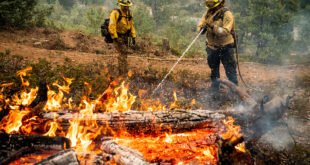History has been made in the Central Valley. A local raisin farmer, Marvin Horne, has been fighting for almost a decade to keep the government from taking his property. On Monday, the Supreme Court sided with him.
It voted eight to one to strike down a reserve program that seizes excess raisins to stabilize prices.
"It’s going to change the way everybody does business in the raisin industry," Kerman Raisin Farmer Marvin Horne said.
It all started decades ago. The U.S. Department of Agriculture created the Agricultural Marketing Agreement Act, and in that, a reserve program designed to keep excess raisins off the market.
"So that you don’t put too much in it at one time, so the commodity price drops," Raisin Bargaining Association Board Member Dewayne Cardoza said.
Under the program, the government puts percentages of raisin farmers crops into a reserve, providing little to no compensation in return.
"You cant take personal property for the benefit of the government if you don’t pay for it," Horne said.
Horne is one farmer who took matters into his own hands. In 2001, Horne held back his production, and then created his own distribution network, side-stepping the reserve program altogether.
"The USDA sent us out bills for our raisins that we packed an sold and said this is the market value established by RBA, and you owe us the money now," Horne said.
They said he owed a nearly 700,000 dollar fine. Horne took his fight to the Supreme Court. It was tossed around between courts for 11 years, but finally, Horne has won the battle.
"I kind of feel like when Martin Luther King said ‘Thank God. Thank God. We’re free at last," Horne said.
The court voted eight to one to strike down the reserve program, saying it violated the just compensation commands of the Fifth Amendment, but advocates of the program it not only protects the market, but every farmer in it.
"The industry utilizes this tool to keep it equal for everyone concerned so everyone kind of stays whole," Cardoza said.
Cardoza says the program was necessary because it looked out for everyone.
"You really need to have some mechanism that’s able to keep all of us in business," Cardoza said.
 Mariposa Fire Mountain Community Fire Information
Mariposa Fire Mountain Community Fire Information

Wanna Comment?